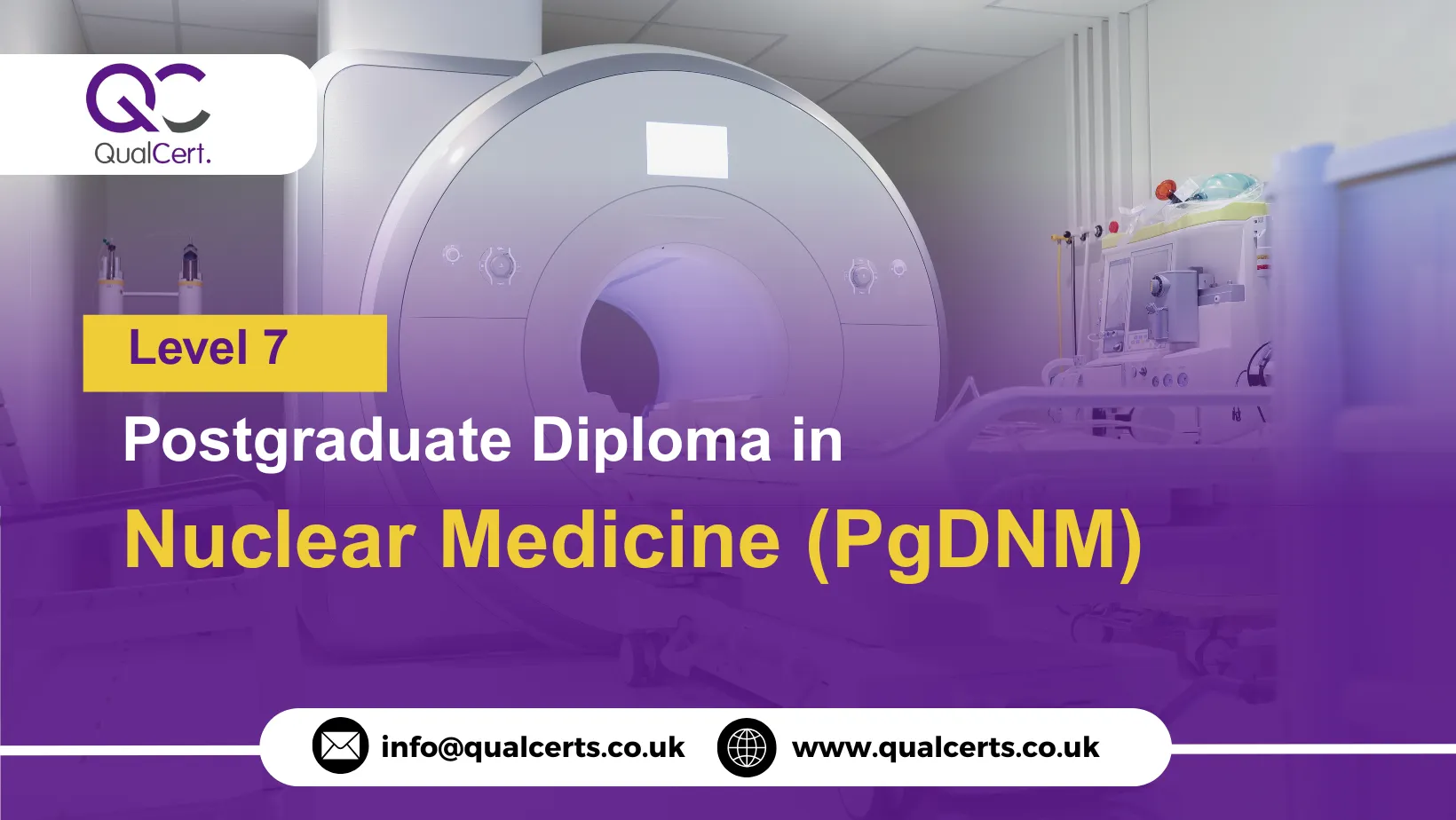The QualCert Level 7 Postgraduate Diploma in Nuclear Medicine (PgDNM) is a UK-accredited programme designed for healthcare professionals seeking advanced knowledge and practical expertise in nuclear medicine and molecular imaging. This postgraduate diploma equips learners with the skills necessary for accurate diagnostics, therapeutic interventions, and evidence-based clinical practice in the field of nuclear medicine.
The PgDNM is structured to provide a thorough understanding of nuclear medicine principles, imaging technologies, and radiopharmaceutical applications. It is suitable for medical practitioners, radiographers, and scientists looking to specialise in nuclear medicine while advancing their professional careers. The course combines theoretical study with practical applications, emphasising patient safety, clinical accuracy, and professional standards in line with UK healthcare regulations.
The QualCert Level 7 Postgraduate Diploma in Nuclear Medicine equips healthcare professionals with the advanced skills, knowledge, and confidence required to deliver high-quality patient care, undertake complex diagnostic and therapeutic procedures, and lead innovation in nuclear medicine services across the UK and internationally.
Course Contents of QualCert Level 7 Postgraduate Diploma in Nuclear Medicine (PgDNM):
The QualCert Level 7 Postgraduate Diploma in Nuclear Medicine (PgDNM), offers 120 Credits, requiring a Total Qualification Time (TQT) of 1200 hours, including 600 Guided Learning Hours (GLH).
| Unit Ref# | Unit Title | Credits | GLH | TQT |
| QC27226- 1 | Principles of Nuclear Medicine and Radiation Physics | 20 | 100 | 200 |
| QC27226-2 | Radiopharmaceuticals: Preparation, Handling, and Safety | 20 | 100 | 200 |
| QC27226-3 | Diagnostic Imaging Techniques and Interpretation in Nuclear Medicine | 20 | 100 | 200 |
| QC27226-4 | Therapeutic Applications in Nuclear Medicine | 20 | 100 | 200 |
| QC27226-5 | Clinical Assessment and Patient Management | 20 | 100 | 200 |
| QC27226-6 | Research, Evidence-Based Practice, and Clinical Decision-Making | 20 | 100 | 200 |
Entry Requirements for the QualCert Level 7 Postgraduate Diploma in Nuclear Medicine (PgDNM):
Minimum Age:
- Applicants must be at least 21 years old.
Educational Background:
- A relevant bachelor’s degree in medicine, radiography, medical physics, or a related healthcare/science field is required.
- Candidates with equivalent professional qualifications or substantial relevant experience may also be considered.
Experience:
- Professional registration or licensure in the relevant healthcare discipline is required where applicable.
- Practical or clinical experience in nuclear medicine, diagnostic imaging, or related fields is highly desirable.
Language Proficiency:
- Proficiency in English is required for all applicants.
- International applicants whose prior education was not in English should provide IELTS 6.5 or equivalent.
Learning Outcomes for the QualCert Level 7 Postgraduate Diploma in Nuclear Medicine (PgDNM):
Principles of Nuclear Medicine and Radiation Physics
- Demonstrate advanced understanding of nuclear medicine principles and radiation physics
- Explain the mechanisms of radioactive decay and radiation interactions with matter
- Analyse imaging modalities and their clinical applications
- Apply principles of radiation protection and safety in clinical practice
Radiopharmaceuticals: Preparation, Handling, and Safety
- Prepare and handle radiopharmaceuticals according to professional standards
- Understand pharmacokinetics and biodistribution of radiopharmaceuticals
- Apply regulatory and safety protocols in clinical settings
- Minimise risk to patients, staff, and the environment during procedures
Diagnostic Imaging Techniques and Interpretation in Nuclear Medicine
- Perform nuclear imaging procedures using SPECT, PET, and hybrid technologies
- Interpret imaging results accurately to support clinical decision-making
- Integrate imaging findings with patient history and clinical data
- Recognise normal and abnormal physiological patterns in scans
Therapeutic Applications in Nuclear Medicine
- Understand principles and protocols for radionuclide therapy
- Develop patient-specific therapeutic plans based on clinical indications
- Monitor and evaluate patient outcomes following nuclear medicine therapy
- Apply safety and ethical considerations in therapeutic procedures
Clinical Assessment and Patient Management
- Conduct comprehensive patient assessments in nuclear medicine settings
- Develop evidence-based management plans for diagnostic and therapeutic interventions
- Monitor patient responses and adjust care strategies as needed
- Communicate effectively with patients and multidisciplinary teams
Research, Evidence-Based Practice, and Clinical Decision-Making
- Critically appraise research literature relevant to nuclear medicine
- Integrate evidence-based findings into clinical practice
- Apply clinical reasoning and decision-making skills in complex cases
- Demonstrate reflective practice to improve professional competence
The Course is ideal for ;
- Medical doctors and radiologists seeking advanced knowledge in nuclear medicine.
- Radiographers, nuclear medicine technologists, and medical physicists looking to specialise in molecular imaging.
- Healthcare professionals involved in diagnostic imaging, therapeutic procedures, or patient management in nuclear medicine.
- Professionals aspiring to leadership, research, or academic roles within nuclear medicine departments.
- International healthcare practitioners looking for a UK-accredited postgraduate qualification in nuclear medicine.
This course is ideal for experienced healthcare professionals committed to advancing their expertise, clinical practice, and career opportunities in nuclear medicine.
To deliver the Level 7 PgDNM, centres must meet the following requirements:
- Qualified Staff: Tutors and clinical supervisors must have postgraduate qualifications and substantial experience in nuclear medicine or related fields.
- Clinical Facilities: Access to nuclear medicine departments, imaging equipment (SPECT, PET, gamma cameras), and radiopharmaceutical preparation areas for practical training.
- Learning Resources: Provision of current textbooks, journals, digital resources, and access to research databases relevant to nuclear medicine.
- Assessment Capability: Ability to conduct both theoretical and practical assessments, including assignments, imaging interpretation, and clinical evaluations.
- Student Support: Systems for academic guidance, mentoring, and pastoral care to support learners throughout the programme.
- Health and Safety Compliance: Adherence to UK health and safety regulations, radiation protection protocols, and infection control standards.
- Quality Assurance: Mechanisms for continuous monitoring and improvement of course delivery, assessment, and learner outcomes.
These requirements ensure learners receive high-quality education, practical experience, and professional guidance in accordance with UK postgraduate standards for nuclear medicine.

